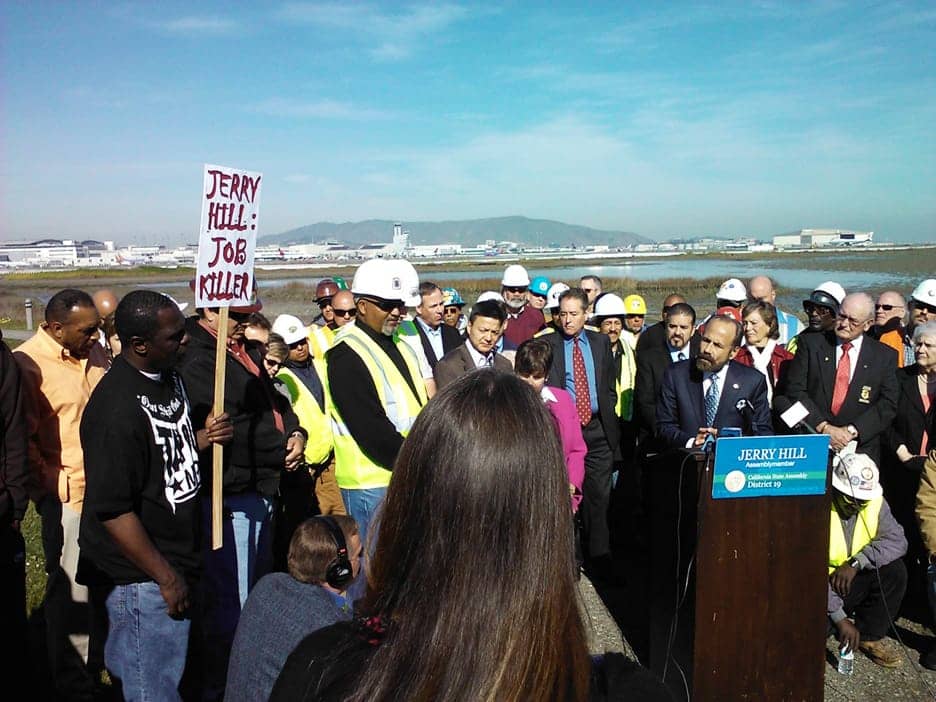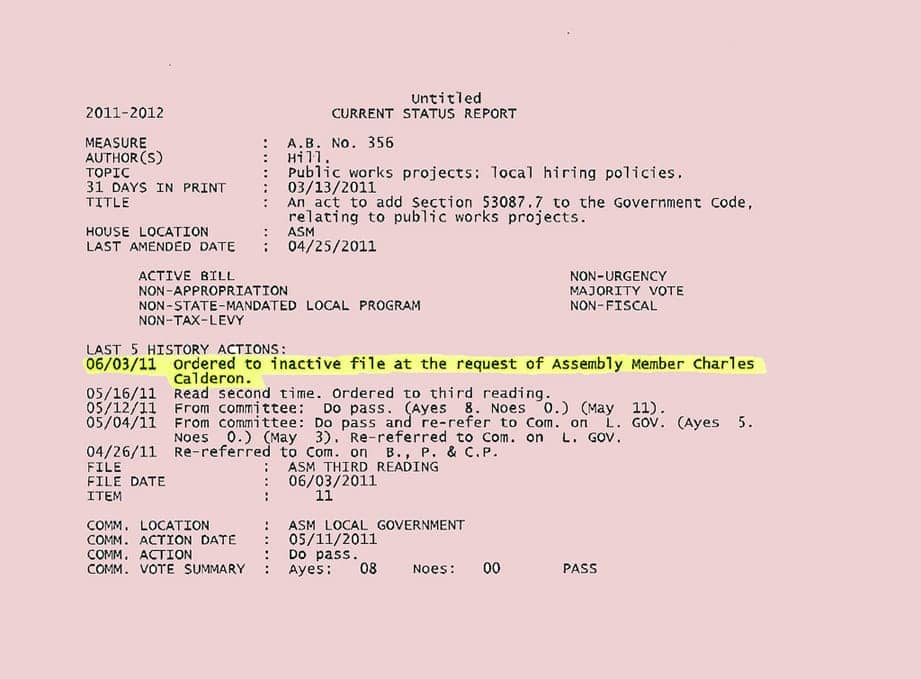Assembly Bill 356 sent to “inactive file” following statewide opposition, partnership between San Francisco and San Mateo counties
by Brightline Defense Project
June 3, 2011 — While Assemblymember Jerry Hill and his controversial anti-local hiring bill AB 356 were busy drawing statewide opposition from three of California’s four largest cities as well as the State Building and Construction Trades Council, the counties of San Francisco and San Mateo were calmly settling their differences for the betterment of workers in both jurisdictions.

While the terms of the agreement are still unknown, San Mateo County counsel John Beiers told the Appeal that “the partnership” would guarantee San Mateo County workers “the ability to work” on airport projects and at Hetch Hetchy. Under the landmark San Francisco local hiring law authored by Supervisor Avalos, the definition of “local” expands to ensure opportunities for locally-impacted communities on city-funded work outside of city limits.
Perhaps the most influential opposition to the bill came yesterday in the form of a request from the State Building Trades that Assemblymembers vote no on AB 356, with a statement of support for local hire policies when they are negotiated under a project labor agreement. San Francisco local hiring advocates have stated that project labor agreements are the best way to implement the City’s local hiring policy, and the position of the State Building Trades is expected to help advance that discussion locally.
Supervisor Avalos had long indicated that “the writing was on the wall” for AB 356 and today said that he is “glad that Assemblymember Hill has finally seen the light.” Avalos added that his legislation “fully anticipated working out such agreements with our regional partners.”
In the past month, Los Angeles Mayor Antonio Villaraigosa’s office issued a stern letter of opposition to AB 356, which followed Councilmember José Huizar’s bold resolution opposing the bill in March. Mayor Lee deployed a delegation to deliver his letter of opposition to Assembly members in April and the San Diego Labor Council indicated its opposition to their state representatives within recent days.
Legislators from both San Francisco and San Mateo, including Sens. Leland Yee and Mark Leno and Assemblymembers Tom Ammiano and Fiona Ma, raised questions about the wisdom of the controversial bill in recent months. An effort to educate state policy makers about the importance of local hiring policies and community-labor partnership was led by Brightline Defense Project Legal Fellow Eddie Ahn.

Opposition that Hill once dismissed as “very localized to San Francisco” went viral and reached national attention through a May 5 letter of opposition penned by Washington D.C.-based Partnership for Working Families. The bill contained legal analyses by community benefits attorney Julian Gross, who worked on the San Francisco local hiring policy, that broadcast for community-labor partnership groups around the state the extent and severity of AB 356’s flaws.
By the time Hill was forced to abandon his bill, opposition had come in from Oakland (East Bay Alliance for a Sustainable Economy, Urban Habitat), Los Angeles (Los Angeles Alliance for a New Economy, Strategic Actions for a Just Economy, Los Angeles Black Worker Center) and San Diego (Center on Policy Initiatives) joining state and national organizations such as Chinese for Affirmative Action, the Equal Justice Society, Greenlining Institute, Global Exchange, A. Philip Randolph Institute and Community Benefits Law Center, all alongside the individuals and organizations that worked so hard to pass local hiring in San Francisco: Aboriginal Blackmen United, Anders and Anders Foundation, Chinese Progressive Association, Coleman Advocates for Children and Youth, Espanola Jackson, Eva Paterson, Filipino Community Center, Kwan Wo Ironworks, Inc., Liberty Builders, Mission Hiring Hall, Inc., NAACP-San Francisco Chapter, Osiris Coalition, ¡PODER!, POWER, San Francisco Bay View newspaper, San Francisco Chinese Club, San Francisco Green Party, South of Market Community Action Network and Young Community Developers.
“Mr. Hill did not understand the issue and should not have wasted the taxpayers’ money in trying to overturn what is right,” said Espanola Jackson, often referred to as the Godmother of Bayview Hunters Point, who has been working to develop opportunities in underserved communities for nearly 50 years.
“We already see local hiring working for communities in San Francisco as well as in San Mateo,” said A. Philip Randolph Institute executive director Jacqueline Flin, who manages a pilot tunnel-training project for union members from disadvantaged Bay Area communities in collaboration with the San Francisco Public Utilities Commission and the Laborers Local 261 Community Service and Training Foundation.
“It was inspiring to see statewide support from community advocates, and also elected officials, advancing the interests of our most underserved community members first,” said Jenny Lam, director of community initiatives for Chinese for Affirmative Action. “The San Francisco local hiring law was a collaboration between community, labor, contractors and government with the needs of both the city and the Bay Area region in mind.”
“There has been one positive thing resulting from the AB 356 debate: It has united leaders and communities all over the state to say that local hire is crucial to economic recovery,” said Greenlining Institute general counsel Samuel Kang. “Jerry Hill awoke a sleeping giant. By trying to kill local hire, he’s only made it stronger.”
“This is great news for our neighborhoods and for workers that have been historically locked out of local opportunities. It shows what a coalition that’s a cross-section of Black, Brown, Asian and white can do – across this city and across this state,” said Oscar Grande, community organizer with ¡PODER ! (People Organizing to Demand Environmental and Economic Rights), who co-emceed last fall’s local hiring rally at City Hall. “We hope that neighborhoods facing the same types of issues and needs down the Peninsula will push their legislators to do what Supervisor Avalos has done for our communities.”
“We were there when Mr. Hill got started with his attack on local hiring and we’re glad to be here to send him off,” said James Richards, president of Aboriginal Blackmen United and journeyman electrician.
“We hoped that our friends in the legislature would help make sure the bill got killed and I’m glad of it,” said Willie Ratcliff, publisher of the San Francisco Bay View newspaper, which has chronicled the quixotic journey of Hill and his bill over the past several months.
“The community and social justice advocates who worked so hard for local hiring in San Francisco found allies across the state and beyond to help stop AB 356,” said Brightline executive director Joshua Arce, who testified in support of local hiring and community workforce agreements during Assembly committee hearings on the bill. “This achievement is really a testament to the strength of communities united.”
Joshua Arce, executive director of Brightline Defense Project, can be reached at josh@brightlinedefense.org. Brightline is a non-profit civil rights advocacy organization dedicated to protecting and empowering communities. Brightline’s efforts have included campaigns to shut down dirty fossil fuel power plants in Southeast San Francisco, promote local renewable energy, and increase blue-collar and green-collar employment opportunities for residents of economically disadvantaged neighborhoods and environmental justice communities. Learn more at www.brightlinedefense.org.





